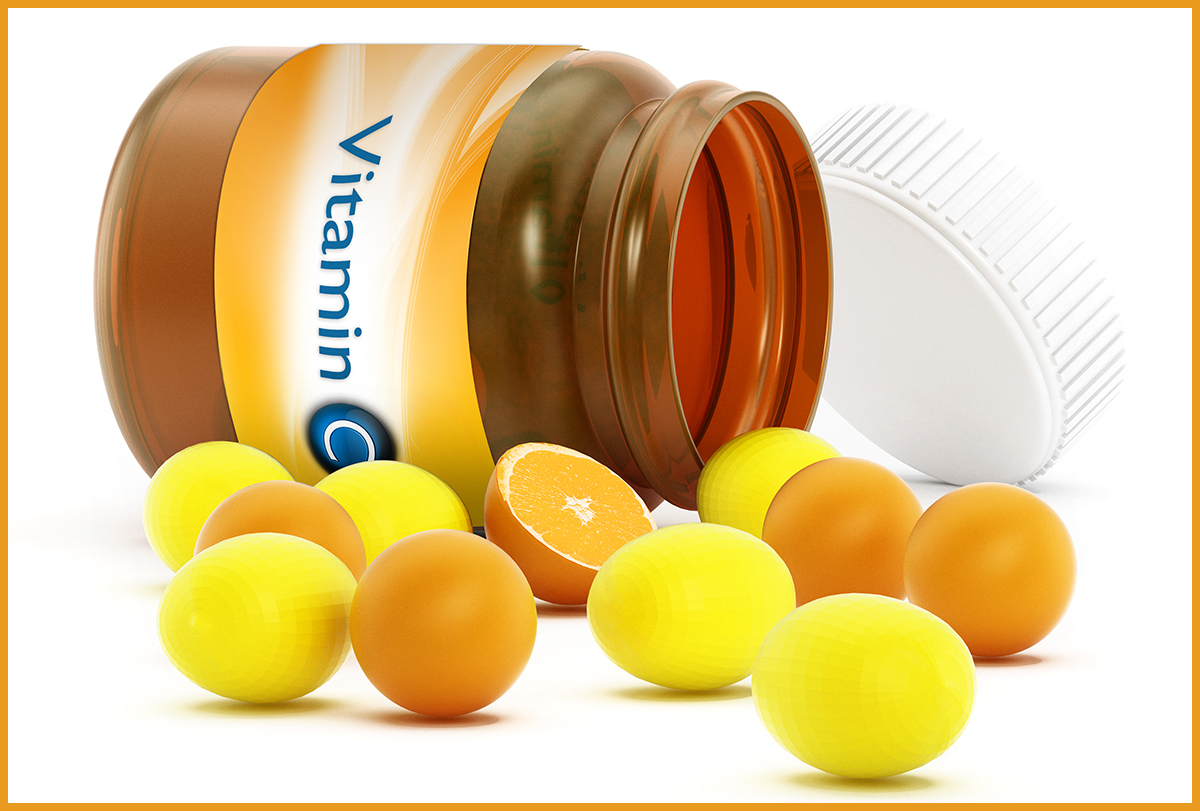In this article:
Vitamin C is one of the 13 essential vitamins, which means it cannot be made in the body, so it must be obtained from food sources. (1)

Vitamin C is water-soluble. The body uses what it needs, and any remaining is eliminated as waste filtered through the kidneys. Vitamin C is necessary for the human body to function optimally, and therefore, its deficiency can cause various problems.
Orange juice is recognized as an energizing, immunity-boosting fuel for the body because it is loaded with vitamin C, which works as a powerful antioxidant.
Vitamin C is currently being added to treatment plans to help combat COVID-19 in hospitalized patients, and some investigators are suggesting taking vitamin C supplements as protection from the novel coronavirus.
As COVID-19 is a novel infection, more research is needed to explore the mechanism and efficacy of using vitamin C for combatting COVID-19. (2)
Daily Requirement of Vitamin C
The daily requirement of vitamin C is 90 milligrams for a healthy adult male and 75 milligrams for a healthy adult female. Certain populations of people, such as those who smoke or have digestive issues, should take an additional 35 milligrams per day. (1)
Roles of Vitamin C in the Body
As previously mentioned, vitamin C has many functions in the human body. It helps counteract cellular damage before it happens. It also helps to neutralize toxins, thereby reducing inflammation. Vitamin C also plays the following roles.
1. Helps keep your skin healthy

The antioxidant properties of vitamin C can naturally help protect your skin from cellular damage triggered by sun exposure and other toxins. (3)
Vitamin C is also needed by the body to make collagen. (3) As you age, wrinkles appear due to the gradual decrease in the production of collagen, which is made worse by sun damage.
Vitamin C can serve as a great agent for countering both these problems, which explains its widespread use in anti-aging products that can help keep your skin young, taut, and radiant.
2. Preserves mental health
Depression is linked to decreased levels or imbalances of dopamine, norepinephrine, and serotonin, which are neurotransmitters that play important roles in regulating mood.
Vitamin C serves as a cofactor for dopamine-beta-hydroxylase, an enzyme required to convert dopamine into norepinephrine. Therefore, a deficiency of vitamin C can directly affect norepinephrine levels and negatively affect your mood, leading to depressive symptoms or worsening existing depression. (4)
3. Supports fat metabolism
Although many variables are correlated with obesity and its causes, experts see an inverse relationship between vitamin C and weight gain. Low levels of vitamin C have been linked to higher amounts of abdominal fat. (5)
Vitamin C may help protect against obesity by regulating the release of fat from fat cells and by exerting its strong antioxidant capability to decrease inflammation and reduce the release of stress hormones that contribute to weight gain.
Vitamin C Deficiency
A vitamin deficiency can occur if a person fails to meet the daily requirements through their diet. This can be easily rectified by consuming a balanced meal or taking supplements, as suggested by a doctor.
However, in some cases, other factors may prevent the absorption of the vitamin in the body. These factors include:
Vitamin C is absorbed in the intestines by two transport proteins. About 28% of the population carries a gene mutation in one of these proteins, causing decreased vitamin C absorption and accumulation.
Moreover, those that have the Hp2-2 allele are at an increased risk of having vitamin C deficiency. (9)
Symptoms of Vitamin C Deficiency

The body relies on vitamin C for several multisystem body functions. Thus, the symptoms of vitamin C deficiency are numerous and can vary in severity. Some of the most common symptoms are:
- Joint pain or swelling
- Blurred vision
- Light sensitivity
- Headache
- Fatigue
- Depression
- Dizziness
- Mood swings
- Mental confusion
- Tender swollen gums (gingivitis)
- Tooth decay
- Easy bruising
- Shortness of breath (10)
Dietary Recommendations to Increase Vitamin C Levels
In general, no particular dietary changes are really necessary when considering normal daily intake. However, it is important to mention that vitamin C levels in food decline when cooked at high temperatures or when left exposed to air.
Therefore, to get the most vitamin C from the food you eat, consume your food raw in their natural form or semi-cooked. Avoid boiling, if possible. If juicing, be sure to drink the juice soon after extraction and not leave it sitting out for too long.
The following fruits and vegetables are recognized as some of the best sources of vitamin C:
- Oranges
- Grapefruits
- Pineapples
- Mangoes
- Strawberries
- Cantaloupes
- Papayas
- Guavas
- Kiwi fruits
- Tomatoes
- Green peas
- Broccoli
- Cauliflower
- Peppers
- Potatoes
- Brussels sprouts
- Sauerkraut or kimchi
- Spinach
How Long Does It Take to Recover From a Vitamin C Deficiency?
The course of recovery depends on the degree of deficiency. However, symptoms of vitamin C deficiency can start to improve within 24–48 hours of replenishing it through the diet (whole-food sources) or adequate supplementation.
Vitamin C vs. Ascorbic Acid
Although people often use the terms vitamins C and ascorbic acid interchangeably, they are not exactly the same.
Ascorbic acid is a chemical name assigned to the most unadulterated form of vitamin C. However, this pure form does not occur naturally. It has to be synthesized through chemical processing. Thus, it is ironic that the purest form of vitamin C, which is ascorbic acid, can only be obtained through unnatural means.
Complications Associated With Vitamin C Deficiency

Severe forms of vitamin C deficiency can lead to potentially fatal consequences, but fortunately, it is highly uncommon in today’s day and age due to improvements in the diets.
- Scurvy, the most dangerous form of vitamin C deficiency, can be life-threatening (11) because it may lead to spontaneous bleeding, severe anemia, and ultimately organ failure and death.
- Vitamin C deficiency and iron deficiency anemia often coexist. (12) Vitamin C enhances the absorption of iron, which is why some doctors recommend taking your iron supplement with orange juice. Conversely, low levels of vitamin C can directly lead to anemia by causing excessive bleeding.
Final Word
Vitamin C plays a vital role in maintaining immune health and supports the growth and repair of tissues. It is popularly used for its antioxidant nature, which helps delay aging and prevent various diseases.
As this vitamin is water-soluble, the excess can be passed through the urine. Therefore, vitamin C must be taken daily to meet the body’s needs. For deficiency, consulting a doctor for the proper diet or supplements may be required.
- Was this article helpful?
- YES, THANKS!NOT REALLY


